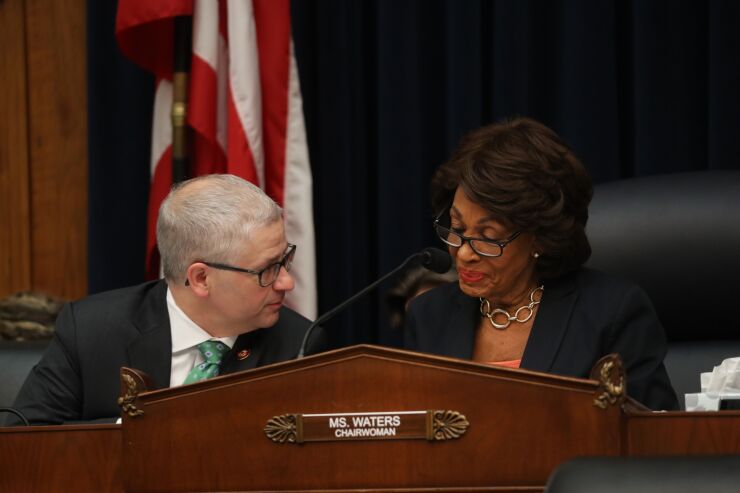The stunning fall from grace of crypto firm FTX is prompting policymakers across Washington to consider how regulation of the broader cryptocurrency world could affect the financial system, including the safety and soundness of banks.
Several lawmakers, including Rep. Maxine Waters (D-Calif.), chair of the House Financial Services Committee, and Sen. Sherrod Brown (D-Ohio), chair of the Senate Banking Committee, have

The calls come after crypto exchange FTX lent billions of dollars worth of customer assets to fund risky bets by its affiliated trading firm, Alameda Research, according to
Waters, who's been working on a stablecoin bill with McHenry, called FTX's spiral the "latest example in a string of incidents involving the collapse of cryptocurrency companies and the impacts these failures have on consumers and investors." She echoed McHenry's previous statements that the event increases the urgency for lawmakers to pass legislation.
"I've been working around the clock with Ranking Member Patrick McHenry to craft bipartisan legislation that establishes a federal framework for stablecoins in order to begin building the safeguards needed to protect customers' assets and insulate our financial markets from contagion," she said. "This week's news further highlights the urgent need for legislation."
Brown called for U.S. regulators to investigate FTX's demise, and pointed to potential implications for the banking system, although he notably didn't join the chorus of legislators calling for Congress to come up with some kind of regulatory framework.
"The recent collapse of FTX is a loud warning bell that cryptocurrencies can fail, and just like we saw with over-the-counter derivatives that led to a financial crisis, these failures can have a ripple effect on consumers and other parts of our financial system," Brown said. "The cryptocurrency market's continued turmoil is why we must think carefully about how to regulate cryptocurrencies and their role in our economy. It is crucial that our financial watchdogs look into what led to FTX's collapse so we can fully understand the misconduct and abuses that took place. I will continue to work with them to hold bad actors in crypto markets accountable. I'm committed to finding the best path forward to protect consumers and the stability of the U.S. markets and banking system."

While FTX is reportedly the subject of probes by the Securities and Exchange Commission and Department of Justice, banking regulators have largely kept quiet about the crypto melee. The Federal Deposit Insurance Corp. previously issued a cease-and-desist letter to FTX for misrepresenting deposit insurance, but hasn't issued any further statements or guidelines related to the exchange's unraveling.
The FDIC declined to comment on whether it is currently investigating FTX or its banks.
But that doesn't mean that banks and their overseers are entirely out of the fray. Regulators have repeatedly warned that banks need to police the risk of their partnerships with fintechs and crypto companies, and they'll likely be a part of the discussion going forward on how to tamp down some of these risks.
"It gives regulators the opportunity to say I think we got some of this right," said John Popeo, principal at the Gallatin Group, who previously worked at the FDIC, where he led deals to unwind failing banks during the financial crisis. "And it certainly lights a fire under legislators on the Hill. I think they're going to be taking a much more careful look going forward."
Banks have repeatedly noted that they've remained largely insulated from turmoil in the crypto market, and for the most part, industry groups say they don't want the risk running into their business models.
"There is one way this event could have generated financial instability: If the firms involved had been embedded into the nation's payments system via master accounts at the Federal Reserve Banks," the Bank Policy Institute said Thursday on a Twitter thread. "The lesson: don't bail out a failing industry by giving it access to Fed accounts and providing it a new business model, thereby linking it to the regulated financial system and heightening the risk that the next cryptoverse crisis actually could harm financial stability."
Anthony Tu-Sekine, head of Seward & Kissel's blockchain and cryptocurrency group, said he expects to see a lot more "regulation by enforcement" at various financial agencies, including at banking agencies that oversee banks that partner with crypto companies, following the FTX news. While that likely won't change the business models of crypto-focused banks, it will likely prevent other banks from trying to break into the business, he said.
The FTX unwinding could have bigger implications, depending on how the company's contracts were written, said Todd Phillips, a progressive policy advocate who has worked in banking policy. If FTX was essentially providing a custody service for customers' assets, meaning it held the assets but didn't technically own them, then moved assets to Alameda, that's still a big problem, but it's probably not something banking regulators would get involved in.
But if FTX was taking customers' assets as if they were loans, becoming FTX's property, then FTX would have owed customers a debt, and the company could be more vulnerable to claims of illegal banking, and banking regulators could have more authority to step in. Ultimately for FTX, it doesn't really matter, but it's an opening for banking regulators to define more carefully what is and isn't banking.
"One is illegal banking, and one is stealing from customers," Phillips said. "So at the end of the day, FTX is still really screwed."





